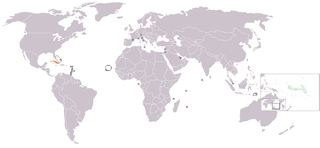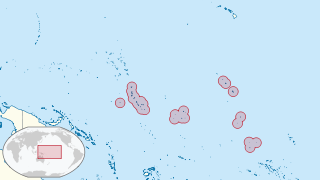
Kiribati,officially the Republic of Kiribati,is an island country in the Micronesia subregion of Oceania in the central Pacific Ocean. Its permanent population is over 119,000 as of the 2020 census,with more than half living on Tarawa atoll. The state comprises 32 atolls and one remote raised coral island,Banaba. Its total land area is 811 km2 (313 sq mi) dispersed over 3,441,810 km2 (1,328,890 sq mi) of ocean.

Politics of Kiribati takes place in a framework of a parliamentary representative democratic republic,whereby the Beretitenti,President of Kiribati,is both the head of state and head of government,and of a multi-party system. Executive power is exercised by the government,Beretitenti,and his cabinet,all MPs. Legislative power is exercised by the House of Assembly. The Judiciary of Kiribati is independent of the executive and the legislature. The Constitution of Kiribati,promulgated at independence on 12 July 1979,establishes the Republic of Kiribati as a sovereign democratic republic and guarantees the fundamental rights of its citizens and residents.

The Pacific Islands Forum (PIF) is an inter-governmental organization that aims to enhance cooperation among countries and territories of Oceania,including formation of a trade bloc and regional peacekeeping operations. It was founded in 1971 as the South Pacific Forum (SPF),and changed its name in 1999 to "Pacific Islands Forum",so as to be more inclusive of the Forum's Oceania-spanning membership of both north and south Pacific island countries,including Australia. It is a United Nations General Assembly observer.

Anote Tong is an I-Kiribati politician for the Pillars of Truth party and environmental activist with half Chinese heritage,who served as the fourth president of Kiribati,from 2003 to 2016. He won the election in July 2003 with a slim plurality of votes cast (47.4%) against his older brother,Harry Tong (43.5%) and the private lawyer Banuera Berina (9.1%). The elections were contested by the opposition,due to allegations of electoral fraud but the High Court of Tarawa had confirmed that there was no fraud. He was re-elected on 17 October 2007 for a second term (64%). In 2012,Tong was reelected for a third term,although with a significantly smaller percentage than in the previous two elections.

Oceania is,to the People's Republic of China and the Republic of China,a stage for continuous diplomatic competition. The PRC dictates that no state can have diplomatic relations with both the PRC and the ROC. As of 2024,eleven states in Oceania have diplomatic relations with the PRC,and three have diplomatic relations with the ROC. These numbers fluctuate as Pacific Island nations re-evaluate their foreign policies,and occasionally shift diplomatic recognition between Beijing and Taipei. The issue of which "Chinese" government to recognize has become a central theme in the elections of numerous Pacific island nations,and has led to several votes of no-confidence.
Cuban-Pacific relations are diplomatic,economic,cultural,and other relations between the Cuba and countries situated in Oceania. In the 2000s,Cuba has been strengthening its relations with Pacific nations,which have,for the most part,responded favorably to Cuban medical aid in particular. The first Cuba-Pacific Islands ministerial meeting was held in September 2008 in Havana,with government members from ten Pacific countries—Kiribati,Tuvalu,Nauru,Solomon Islands,Fiji,Tonga,Vanuatu,Samoa,the Federated States of Micronesia and Papua New Guinea—attending. The meeting was a consolidation rather than a starting point of Cuban-Pacific relations.

Diplomatic relations between Kiribati and Cuba developed in the 2000s (decade). Like other countries in Oceania,Kiribati is a beneficiary of Cuban medical aid;bilateral relations between Tarawa and Havana must be viewed within the scope of Cuba's regional policy in Oceania.

The Cabinet of Kiribati is the cabinet of the government of the Republic of Kiribati.

Parliamentary elections were held in Kiribati on October 21 and 28,2011. In the first round,exactly half of the 44 members of parliament were elected,with the remainder chosen in the proceeding run-off elections. 30 candidates were reelected,and four government ministers lost their seats. One seat had to go to a third round of elections due to two candidates tying in the second round. In the third round,Jacob Teem defended his seat against Rutio Bangao with just 27 votes difference. The parliament in Kiribati is known as Maneaba ni Maungatabu. The next parliamentary election was not scheduled until 2015.

Rimeta Beniamina is an I-Kiribati politician and a former leader of the defunct United Coalition Party. Beniamina,who is from the island of Nikunau in southern Kiribati,is the son of former Vice President Beniamina Tinga.

This national electoral calendar for 2016 lists the national/federal elections held in 2016 in all sovereign states and their dependent territories. By-elections are excluded,though national referendums are included.

Parliamentary elections were held in Kiribati on 30 December 2015,with a second round of voting for 25 seats on 7 January 2016. The result was a victory for the Pillars of Truth party,which won 26 of the 46 seats.

Presidential elections were held in Kiribati on 9 March 2016. The result was a victory for Taneti Maamau of the Tobwaan Kiribati Party,who received 60% of the vote,with Rimeta Beniamina on 38.6% and Tianeti Ioane 1.5%.

Taneti Maamau is an I-Kiribati politician who has served as the fifth president of Kiribati since 11 March 2016.

Teuea Toatu is an I-Kiribati politician who is the current vice president and minister for Finance &Economic Development in the Cabinet of Kiribati. He is 1 of 3 Members of the House of Assembly representing the constituency of Abaiang. He was appointed vice-president (Kauoman-ni-Beretienti) on 19 June 2019. He graduated with a BA in accounting and economics form the University of the South Pacific in 1980,and completed a certificate in computing at the University of East Anglia in 1984. He subsequently completed his MSc at the University of Strathclyde and his PhD at the Australian National University.

Tessie Eria Lambourne is an I-Kiribati civil servant,diplomat and politician. She has been a member of the Maneaba ni Maungatabu (Parliament) since April 2020. She was formerly Kiribati's Ambassador to the Republic of China (Taiwan) from June 2018 to September 2019 and Secretary to the Cabinet,the highest position in Kiribati's civil service,from August 2016 until June 2018.
Maere Tekanene is a former I-Kiribati politician,and part of the Pillars of Truth party,who was the Kiribati Member of Parliament for the South Tarawa constituency from 2011,and the Education Minister from 2012,until losing her seat at the 2015–16 parliamentary election.

The COVID-19 pandemic in Kiribati is part of the ongoing worldwide pandemic of coronavirus disease 2019 caused by severe acute respiratory syndrome coronavirus 2. The virus was confirmed to have reached Kiribati on 18 May 2021.
Kobebe Taitai is an I-Kiribati politician,Minister for Health and Medical Services,from 2016 to 2018,then Ministry of Internal Affairs,from 2018 to 2020. He was elected for Tabiteuea North at the 2016 Kiribati general elections. He is a member of Boutokaan te Koaua.












